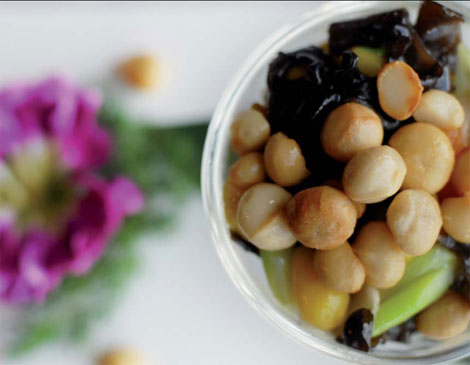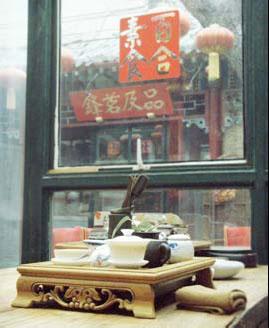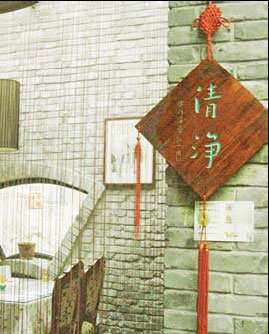Veggie might
Updated: 2012-03-02 07:58
By Wang Yuan (China Daily)
|
||||||||
|
Vegetarian diets have been becoming popular in China in recent years. [Photos provided to China Daily] |
Vegetarian trends build on venerable Chinese traditions
From the moment you enter, you feel that this is going to be a different kind of restaurant. The green gate at the entrance, the wooden tables in the siheyuan, or courtyard house, and the traditional Chinese decorations whisper one word: Confucius.
This is Baihe vegetarian restaurant, in a small hutong, or alleyway in the Dongzhimen district of Beijing. Customers at the restaurant, opened 10 years ago, come from all walks of life, whether they are vegetarians or the most inveterate meat eaters.
A seal-like print on one table shows that one satisfied guest here was the Egyptian ambassador to China, hinting at the international appeal of vegetarian food.
|
A vegetarian restaurant is more like a teahouse where customers can read books and spend hours chatting with friends. |
Where Confucius fits into all of this is the fact that much of what goes on in Baihe is infused with the spirit of the sage. That applies not only to the food and beverages on the table but to teachings that are passed on to staff each day by Baihe's manager, Xu Yefeng. He teaches his employees to read Confucian classics such as the Four Books: The Analects of Confucius, Mencius, The Great Learning and The Doctrine of the Mean.
"Every morning before work, we present incense to Confucius' portrait," Xu says.
"It's a bit like a way of life for us."
Then they begin their morning reading. Customers, too, are given the opportunity to lap up wisdom and knowledge in the restaurant. Adding to the sedate, homely atmosphere, its windows are lined with books about Chinese culture and history.
But Baihe is just one of dozens of vegetarian restaurants that have opened up around China in recent years, by tapping on the appeal of eschewing animal products and following a modern trend in the West. These in turn build on a long history of vegetarianism in the country.
The latest resurgence in the diet may well have been given a push by a claim from some environmentalists that if everyone stopped eating meat, global warming would be reduced 8 percent.
Whether that claim is true or not is probably a moot point for Xu, who says that, for many Chinese vegetarians, it is about "following a kind of diet that brings harmony between nature and humankind. In being vegetarian you express your attitude to life ... . Most (non-vegetarian restaurants) are preoccupied with making money. The food here is about a way of thinking or philosophy ... a mild and healthy way of living".
Apart from food, Chinese vegetarian restaurants like Baihe also sell organic products.
There are estimated to be about 90 vegetarian restaurants in Beijing and about 20 in Shanghai, and most have opened in the past 10 years.
In many of those restaurants, it is not only animal, egg and milk products that are anathema; if you are thinking about washing down that hot vegetarian pie with a glass or two of fine wine, forget it - they ban alcohol and smoking.
|
The food here touches on the philosophical. |
If that all sounds a little too straight-laced, many of these establishments in fact have a laid back feel about them, being more like cafes or teahouses where, besides eating, you can read books and spend hours chatting with friends.
The Chinese vegetarian tradition dates back to the Spring and Autumn Period (770-476 BC), when such food was eaten in the days leading up to important ceremonies in which sacrificial offerings were made. It was believed that such a diet "cleansed the body and purified the mind".
As Buddhism and Taoism spread following a period in which nature-oriented diet held sway, vegetarian food became more popular. Vegetarian food was particularly prevalent among courtiers during the Tang Dynasty (AD 618-907).
At the turn of the 20th century, there were about 700 vegetarian restaurants in Beijing alone. The restaurants experienced a period of decline after China was immersed in wars in first half of that century. There were at least three distinct styles for vegetarian food: courtier, monastic and popular.
Food in the courts consisted of at least 200 dishes and was famous for its highly selective choice of ingredients and intricate preparation and cooking, with some dishes needing almost a week to prepare.
Making mock meat is regarded as one of the most demanding tests for a vegetarian cook. Yizhichan, or single finger zen, which looks and tastes like sausage, is a common mock meat dish. The bulk of the sausage is made of soybean, and the fat comes from lotus root. Other mock vegetarian or vegan foods, all made from vegetable, include "chicken", "beef", "duck", noodles and wontons. Most of the mock meat is made from material obtained from soybeans, and refined cooking skills can make them look and taste like the real thing.
In Beijing, a meal in a typical vegetarian restaurant can set you back about 100 yuan ($16, 12 euros), but that will cover extra servings.
"Most vegetarian restaurants offer delicious food. Some of them taste even better than meat. I like to my spend afternoons here, where I can find peace," says 30-year-old university research assistant Cui Xianglan, who became a vegetarian food advocate four years ago.
Some universities canteens, including those at the elite Peking and Tsinghua universities, also have vegetarian food available in line with changing dietary perceptions.
"Diets have a decisive influence on their health and more people have realized this," says Tian Yongsheng, who researches food safety in China.
"The number of people dying from heart disease will obviously decrease if there's more people opting for vegetarian food.
"The rising trend of vegetarian food in major cities show that more Chinese people are going back to a healthy way of living."

 Relief reaches isolated village
Relief reaches isolated village
 Rainfall poses new threats to quake-hit region
Rainfall poses new threats to quake-hit region
 Funerals begin for Boston bombing victims
Funerals begin for Boston bombing victims
 Quake takeaway from China's Air Force
Quake takeaway from China's Air Force
 Obama celebrates young inventors at science fair
Obama celebrates young inventors at science fair
 Earth Day marked around the world
Earth Day marked around the world
 Volunteer team helping students find sense of normalcy
Volunteer team helping students find sense of normalcy
 Ethnic groups quick to join rescue efforts
Ethnic groups quick to join rescue efforts
Most Viewed
Editor's Picks

|

|

|

|

|

|
Today's Top News
Chinese fleet drives out Japan's boats from Diaoyu
Health new priority for quake zone
Inspired by Guan, more Chinese pick up golf
Russia criticizes US reports on human rights
China, ROK criticize visits to shrine
Sino-US shared interests emphasized
China 'aims to share its dream with world'
Chinese president appoints 5 new ambassadors
US Weekly

|

|









